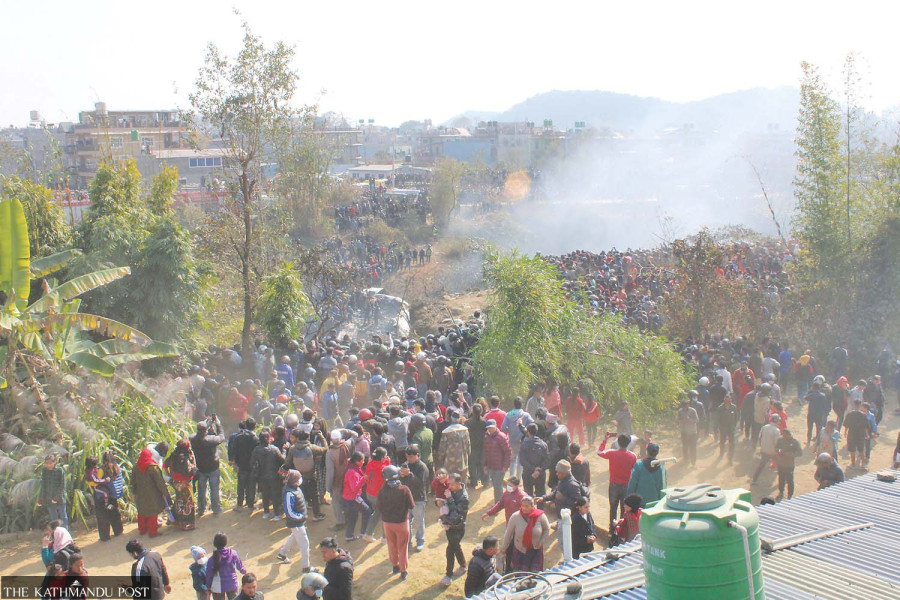Money
Bill on liability insurance of air carriers stalls again
As per draft law, domestic airlines have to pay a minimum of $100,000 for the injury or death of a passenger.
Sangam Prasain
The process of enacting a separate air carriers’ liability and insurance legislation for domestic carriers has stalled yet again.
On March 1, the Cabinet approved the tourism ministry’s proposal to prepare a draft bill on domestic air carriers’ liability and insurance.
This was done years after Nepal adopted the Montreal Convention of 1999, which makes international airlines liable in case of death or injury to passengers. Nepal adopted the Montreal Convention of 1999 on December 15, 2018.
The tourism ministry officials say that the process stalled this time after Buddhi Sagar Lamichhane, the chairman of the panel appointed to prepare the draft bill, was automatically suspended on April 5. This happened after the Commission for Investigation of Abuse of Authority filed a case against 32 individuals, including Lamichhane, at the Special Court over their alleged involvement in corruption in the April 2017 Airbus A330s deal.
Mukesh Dangol, an official at the tourism ministry, said the ministry has appointed Indu Ghimire, its joint-secretary, to head the panel. “With this latest development, the process will now move ahead.”
He said that after a round of consultation with the stakeholders, the draft will be sent to the finance and law ministries seeking their consent. “Following their nod, the draft will be tabled at the Cabinet before it is registered in Parliament.”
The draft, however, is already ready. Officials expect the registration process to be completed in at least two months.
The draft of the air carriers’ liability and insurance bill from domestic carriers, which proposes a five-fold increase in compensation for death or injury, has been in the making since Nepal ratified the Montreal Convention.
The draft bill was extensively discussed with the stakeholders before it was finalised in 2020.
However, successive tourism ministers failed to table the bill in Parliament. The draft bill was then kept on hold without much explanation.
The long-delayed air carriers’ liability and insurance draft bill proposes a fivefold increase in compensation for death or injury.
As per the planned law, domestic airlines have to pay a minimum compensation of $100,000 for the injury or death of a passenger. Currently, the minimum compensation for passenger death on a domestic flight is $20,000.
Under the Montreal Convention of the International Civil Aviation Organization (ICAO), carriers have to pay 128,821 Special Drawing Rights (SDRs) or ($171,018) if the damage is due to the carrier’s negligence or a wrongful act or omission.
SDRs are an interest-bearing international reserve asset used by the International Monetary Fund.
Under the Montreal Convention 1999, in any crash, the victims’ families have the right to claim unlimited compensation if there is a wrongful death.
The draft bill says that the carrier should make an advance payment when it is necessary to meet the immediate economic needs of passengers or the families of victims.
According to the proposed law, a compensation claim should be filed with the airline or its agents within 60 days of the incident or accident. The carrier’s liability limitation for cargo lost, damaged or delayed shall be $20 per kg if the damage was caused or contributed to by the negligence of the carriers, it says.
Under the Montreal Convention 1999, effective as of December 28, 2019, a carrier’s liability limitation for cargo lost, damaged or delayed shall be 22 SDRs per kg ($29.21 per kg) in the case of destruction, loss, damage or delay concerning cargo carriage.
Similarly, carriers must pay 1,288 SDRs ($1,709.90) for each passenger in case of baggage destruction, loss, damage, or delay.
Likewise, 5,346 SDRs ($7,097.16) should be compensated for each passenger in relation to damage caused by delay in the carriage of persons.
The domestic carriers, however, have been objecting to a few clauses, such as the carrier’s liability for delays and unlimited compensation, which, according to them, is not practical in a country like Nepal.
Airlines officials say that, given Nepal’s geographical terrain, climatic behaviour, and airport facilities, Nepali airlines cannot afford to be liable for delays.
According to tourism ministry officials, the proposed legislation is a modified version of the Montreal Convention 1999 as there are several clauses that domestic airlines would not be able to comply with.
Frequent ministerial changes have slowed it down, they say. Some ministers held their positions for long enough but were not bothered about pushing the bill.
The bill could not be registered as Parliament was prorogued several times in the past.
As a result of the delay, passengers who died in the Yeti Airlines plane crash in January 2023 missed out on compensation in millions of rupees.
The Yeti Airlines tragedy in Pokhara was Nepal’s 104th crash and the third biggest in terms of casualties.
According to Nepal’s civil aviation body, more than 900 people have died in air crashes in the country since the first disaster was recorded in August 1955.
The biggest air accident took place on September 28, 1992, when an Airbus A310 belonging to Pakistan International Airlines slammed into a hillside at Bhattedanda near Kathmandu Valley, killing 167 people on board.
Earlier, on July 31, 1992, an Airbus A310 of Thai Airways crashed in Ghyangphedi, killing 113 on board.
Nepal’s domestic airlines—nine fixed-wing operators and 12 helicopters—flew 4.15 million passengers in 2023.




 10.12°C Kathmandu
10.12°C Kathmandu














